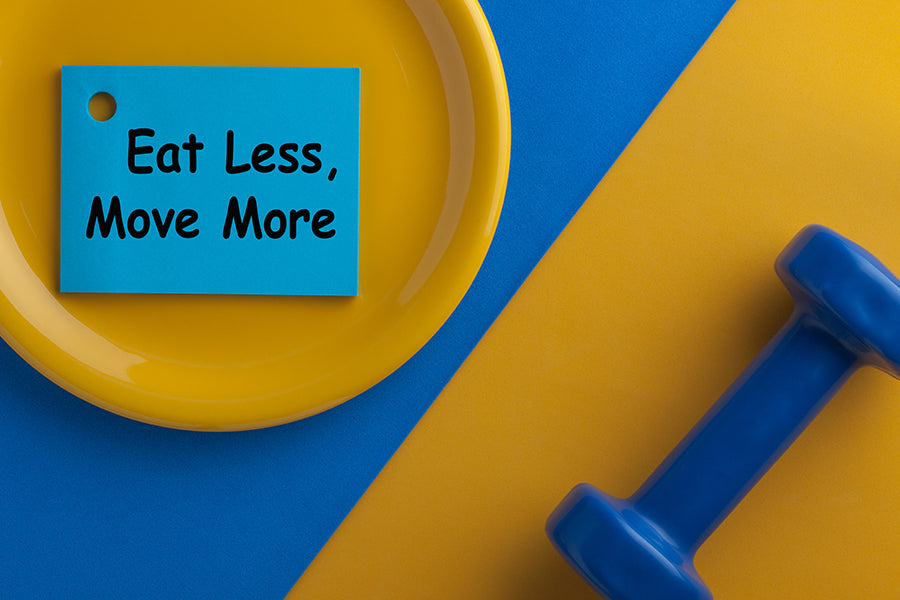Are you looking to kickstart your weight loss journey? The good news is that you can use a few simple strategies to set the wheels in motion. One of these strategies revolves around the age-old adage: 'Eat Less, Move More.' Though it may sound somewhat simplistic, it does indeed have some validity and offers an effective way for people to start getting results.
In this blog post, we'll take a deeper look into the age-old question of whether or not eating fewer calories, and increasing exercise could achieve successful long-term weight loss goals.
We'll analyze the benefits behind these tactics while also examining the potential dark side they may come with. Read on to learn more about "eat less, move more."
What is 'Eat Less, Move More'?
'Eat less, move more' is an idea rooted in health and wellness that encourages individuals to restrict their food intake and increase physical activity. This simple yet effective concept suggests that by reducing calorie consumption and incorporating regular exercise into one's daily routine, the individual will lead a healthier lifestyle.
Encouraging people to focus on smaller portions at meals and engage in regular physical activity, 'eat less, move more' seeks to create a balance between calorie intake and calorie expenditure.
It is crucial to consider both quality and quantity regarding food consumption. As well as exercising regularly and tracking physical activity levels, 'eat less, move more' focuses on nutrition by emphasizing the importance of eating green leafy vegetables and lean proteins while limiting processed foods.
Essentially, the message behind 'eat less, move more' is conscious wellness, making a mindful choice about our diets and activities that support overall health and well-being.
Does Eating Less & Moving More Work?
Making lifestyle changes centered around nutrition and physical activity are essential components of any exercise routine, but the answer depends on what your goals are.
On the one hand, reducing caloric intake and exercising can be effective in shedding pounds. Eating healthily, with a balanced diet and portion control, can lead to feeling fuller longer and decreased cravings for unhealthy snacks.
Additionally, physical activity can help one boost metabolism and burn excess calories while increasing strength and endurance. Some may find that simply cutting calories isn't enough to prompt lasting weight loss.
With fad diets or drastic calorie counting, users may find themselves ravenous as their bodies adjust to the extreme reduction in food intake; additionally, if they don't adjust their lifestyle - such as increasing their level of activity — the weight could creep back up after the "diet" ends.
Ultimately, although eating less and moving more can benefit from slimming down, it's still advisable to consult a healthcare provider before drastically changing your diet or fitness levels.
Related Article: 5 Best Floor Exercises to Burn Calories & Shrink Belly Fat Fast, Trainer Says
Does Moving More Lead to Weight Loss?
Studies have shown that moving more can effectively lose weight when combined with a balanced diet. Exercise increases metabolism, allowing your body to burn more calories and making it easier to maintain a healthy calorie deficit.
One factor is intensity; while light exercise benefits overall health and well-being, it doesn't typically burn a significant amount of calories needed to create a calorie deficit (burning more calories than you consume).
Engaging in high-intensity interval training or other rigorous forms of exercise is essential to reap the benefits of increased activity levels with weight loss.
Additionally, without proper attention to nutrition, engaging in physical activity could be nullified as many people tend to overestimate the number of calories they burn during exercise sessions.
So if your goal is to lose weight by increasing physical activity levels, you must ensure that you are expending enough energy and not simply eating back all the energy you used up through exercise.
Related Article: Weight Loss: Can You Achieve Your Goal With Exercise Only?
Is It Healthy to Simply 'Eat Less, Move More'?
While it is true that cutting calories and increasing exercise can reduce pounds in the short term, this simplistic approach overlooks many long-term health considerations.
The connection between diet, lifestyle, and overall health is complex and nuanced - depending on an individual's physical makeup, mental outlook, medical history, and so on.
For instance, certain kinds of physical activity can make you hungrier for calorically-dense foods, leading to overconsumption, while calorie restriction carries health risks.
Focusing on food quality is just as important as cutting out the right quantity; nutrient-rich foods, including fresh fruits, vegetables, and proteins, should make up most meals to ensure proper vitamin, mineral, and calorie intake.
Additionally, an exercise routine explicitly tailored to one's individual goals, level of physical fitness, and abilities will potentially maximize results.
While cutting back on calories and hitting the gym may help lead a healthier lifestyle, one must remember to focus on everything from dietary sources of vitamins and minerals to which exercises are most beneficial for their wellness. Therefore, it is essential to consider all factors when assessing whether this widely-repeated advice affects an individual in a healthy manner.
The Bright Side of Eat Less, Move More
The phrase 'Eat Less, Move More' may sound simple, but there are numerous benefits from following this approach to life. The most obvious is weight loss, as eating fewer calories and increasing activity will lead to burning more calories overall. This excess energy expenditure also increases energy, which can help with mental clarity and productivity.
The health benefits are also plentiful. It's also important to remember that this doesn't mean you must completely cut certain foods out, like sweets or carbs, but rather redistribute those intake levels daily so that more healthy items balance them out.
The 'eat less, move more' strategy encourages a balanced lifestyle that ensures all areas are adequately cared for. Not only will this ensure an ideal caloric intake, but it will also keep you active and engaged in life while getting you closer to your goals.
Furthermore, mindfully eating improves overall well-being by introducing more nutrient-dense food into your diet while freeing up mental energy so you can be creative, productive, and successful in other areas.
The benefits of this relatively easy concept are endless; focus on balance, enjoy your food and make time for daily activity—the rest will fall into place!
The Dark Side of Eat Less, Move More
This approach to weight loss may be an effective strategy. However, it does have some disadvantages to it. The "dark side" of this trend is that it can lead to an unhealthy fixation on calories and macros while ignoring nutrient density and other important factors in healthy eating.
Moreover, it fails to factor in the genetic differences between individuals that determine how they metabolize macronutrients or access energy stored in fat cells.
The idea fails to consider the complexity of our lifestyles and bodies. The notion of just reducing calorie intake to lose weight can be fraught with issues such as poor nutrition and even disordered eating habits in extreme cases.
The "Eat Less" part could be taken to the extreme and become too restrictive. Fad dieting could be used which is a form of eating that eliminates entire food groups or prescribes severely limited calories, ultimately leading to decreased mental and physical well-being.
The "Move More" component involves the potential for over-exercising to burn more calories or build muscle – it may also be used as an outlet for anxiety, stress, or even a substitute for unhealthy emotional habits.
The ultimate result of this behavior is often malnutrition, exhaustion, and poor mental health. Unsustainable long-term changes can also lead to burnout and negative self-esteem, leaving the individual frustrated.
Thus, when striving for health and fitness goals, caution should always be exercised when relying on the "eat less, move more" mentality.
FAQs
1. Is it better to eat less or move more?
It depends on your overall health and fitness goals. Eating less and moving more can be effective for weight loss, but it should always be done in a balanced way that considers any nutrition deficiencies or disordered eating habits.
The best approach is to focus on eating nutrient-dense foods and engaging in regular physical activity that fits into your lifestyle. However, you must exercise caution when relying on the "eat less, move more mentality."
2. Does eating less move more work?
The answer to whether or not the "eat less, move more" strategy works is complex. In some cases, it can be a practical approach to weight loss; however, it is essential to remember that this strategy does have its limitations and should be used with caution.
For example, it fails to account for individual differences in metabolic rate and how different people access energy stored in fat cells. Furthermore, this approach may lead to an unhealthy fixation on calories and macros while ignoring nutrient density and other important factors in healthy eating.
3. Will I lose weight if I just eat less?
It can be possible to lose weight while eating less, depending on the individual's overall diet and lifestyle. Eating fewer calories will help reduce body fat.
Still, ensuring that a healthy and balanced diet offsets any calorie deficit with proper nutrition, including lean proteins and complex carbohydrates for energy, is essential. Furthermore, regular physical activity should be included in your daily routine to help maintain your desired body composition.
4. What happens to your body when you start eating less?
When you start eating less, your body may become more efficient at using the energy it stores in fat cells. It means that over time you may experience gradual weight loss as your body begins to burn stored fat for energy.
Depending on how much and fast you reduce your calorie intake, the weight loss process can take anywhere from a few weeks to several months. You may notice changes in cravings and hunger levels when limiting calories.
As a result, nourishing your body with nutrient-dense foods while eating less is vital to maintain optimal health and well-being.
The Bottom Line
Eating less and moving more can help you easily maintain or lose weight, become better acquainted with healthier foods, increase your energy levels and improve your overall health in the long term. The secret is getting into the habit of doing these things in moderation – meaning that it does not need a complete overhaul of your lifestyle – but rather just a few changes here and there. If you want to start eating less and/or moving more, taking small steps towards those goals will bring more significant rewards than going full scale.
Reading List
Article Sources
- Michie, Susan, et al. “Effective Techniques in Healthy Eating and Physical Activity Interventions: A Meta-Regression.” Health Psychology: Official Journal of the Division of Health Psychology, American Psychological Association, vol. 28, no. 6, Nov. 2009, pp. 690–701. PubMed, https://doi.org/10.1037/a0016136.








